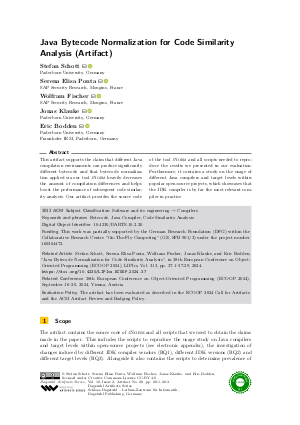Java Bytecode Normalization for Code Similarity Analysis (Artifact)
Authors
Stefan Schott  ,
Serena Elisa Ponta
,
Serena Elisa Ponta  ,
Wolfram Fischer
,
Wolfram Fischer  ,
Jonas Klauke
,
Jonas Klauke  ,
Eric Bodden
,
Eric Bodden 
-
Part of:
Issue:
Special Issue of the 38th European Conference on Object-Oriented Programming (ECOOP 2024)
Part of: Volume: DARTS, Volume 10 (ECOOP 2024)
Part of: Conference: European Conference on Object-Oriented Programming (ECOOP)
Part of: Journal: Dagstuhl Artifacts Series (DARTS) - License:
 Creative Commons Attribution 4.0 International license
Creative Commons Attribution 4.0 International license
- Publication Date: 2024-09-12
Artifact Description

PDF
DARTS.10.2.20.pdf
- Filesize: 476 kB
- 3 pages
Document Identifiers
Subject Classification
ACM Subject Classification
- Software and its engineering → Compilers
Keywords
- Bytecode
- Java Compiler
- Code Similarity Analysis
Metrics
- Access Statistics
-
Total Accesses (updated on a weekly basis)
0PDF Downloads0Metadata Views
Abstract
This artifact supports the claim that different Java compilation environments can produce significantly different bytecode and that bytecode normalization applied via our tool jNorm heavily decreases the amount of compilation differences and helps boost the performance of subsequent code similarity analysis. Our artifact provides the source code of the tool jNorm and all scripts needed to reproduce the results we presented in our evaluation. Furthermore, it contains a study on the usage of different Java compilers and target levels within popular open-source projects, which showcases that the JDK compiler is by far the most relevant compiler in practice.
Cite As Get BibTex
Stefan Schott, Serena Elisa Ponta, Wolfram Fischer, Jonas Klauke, and Eric Bodden. Java Bytecode Normalization for Code Similarity Analysis (Artifact). In Special Issue of the 38th European Conference on Object-Oriented Programming (ECOOP 2024). Dagstuhl Artifacts Series (DARTS), Volume 10, Issue 2, pp. 20:1-20:3, Schloss Dagstuhl – Leibniz-Zentrum für Informatik (2024)
https://doi.org/10.4230/DARTS.10.2.20
BibTex
@Article{schott_et_al:DARTS.10.2.20,
author = {Schott, Stefan and Ponta, Serena Elisa and Fischer, Wolfram and Klauke, Jonas and Bodden, Eric},
title = {{Java Bytecode Normalization for Code Similarity Analysis (Artifact)}},
pages = {20:1--20:3},
journal = {Dagstuhl Artifacts Series},
ISBN = {978-3-95977-342-3},
ISSN = {2509-8195},
year = {2024},
volume = {10},
number = {2},
editor = {Schott, Stefan and Ponta, Serena Elisa and Fischer, Wolfram and Klauke, Jonas and Bodden, Eric},
publisher = {Schloss Dagstuhl -- Leibniz-Zentrum f{\"u}r Informatik},
address = {Dagstuhl, Germany},
URL = {https://drops.dagstuhl.de/entities/document/10.4230/DARTS.10.2.20},
URN = {urn:nbn:de:0030-drops-209189},
doi = {10.4230/DARTS.10.2.20},
annote = {Keywords: Bytecode, Java Compiler, Code Similarity Analysis}
}
Author Details
Funding
This work was partially supported by the German Research Foundation (DFG) within the Collaborative Research Centre "On-The-Fly Computing" (GZ: SFB 901/3) under the project number 160364472.
Artifact
DARTS-10-2-20-artifact-5e7eba9447b1983a73aad8b6d2983432.zip
(Filesize: 9.84 GB)
MD5 Sum:
5e7eba9447b1983a73aad8b6d2983432
(Get MD5 Sum)
Artifact Evaluation Policy
The artifact has been evaluated as described in the ECOOP 2024 Call for Artifacts and the ACM Artifact Review and Badging Policy.
Related Article
- Stefan Schott, Serena Elisa Ponta, Wolfram Fischer, Jonas Klauke, and Eric Bodden, "Java Bytecode Normalization for Code Similarity Analysis", in 38th European Conference on Object-Oriented Programming (ECOOP 2024), LIPIcs, Vol. 313, pp. 37:1-37:29, 2024. https://doi.org/10.4230/LIPIcs.ECOOP.2024.37
